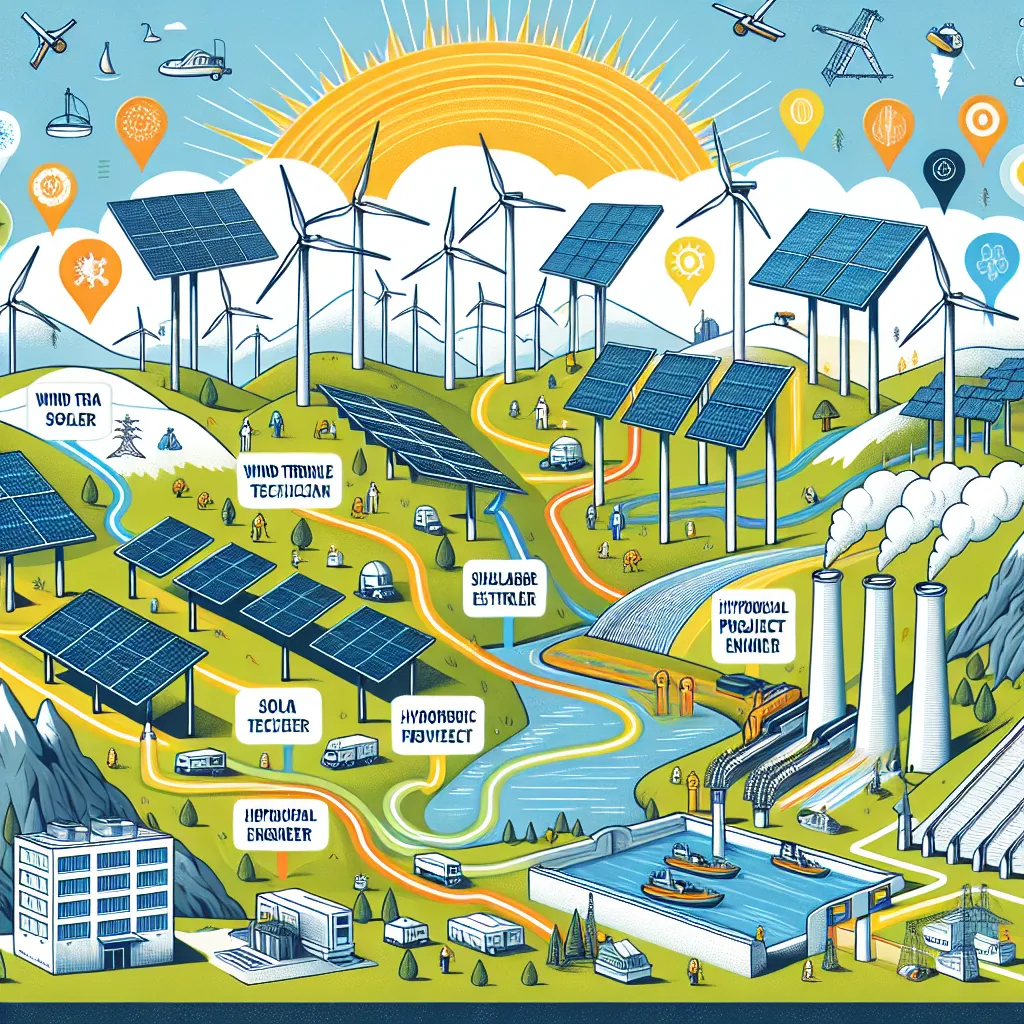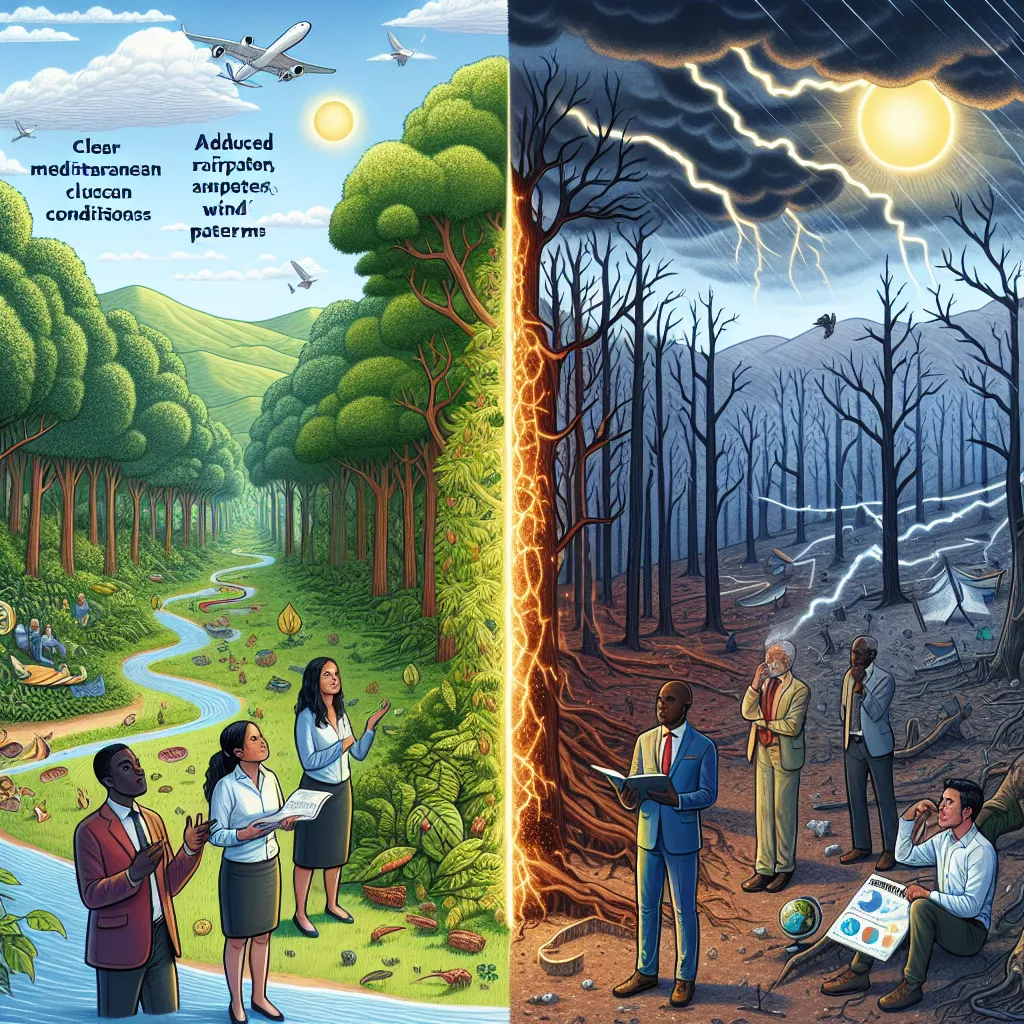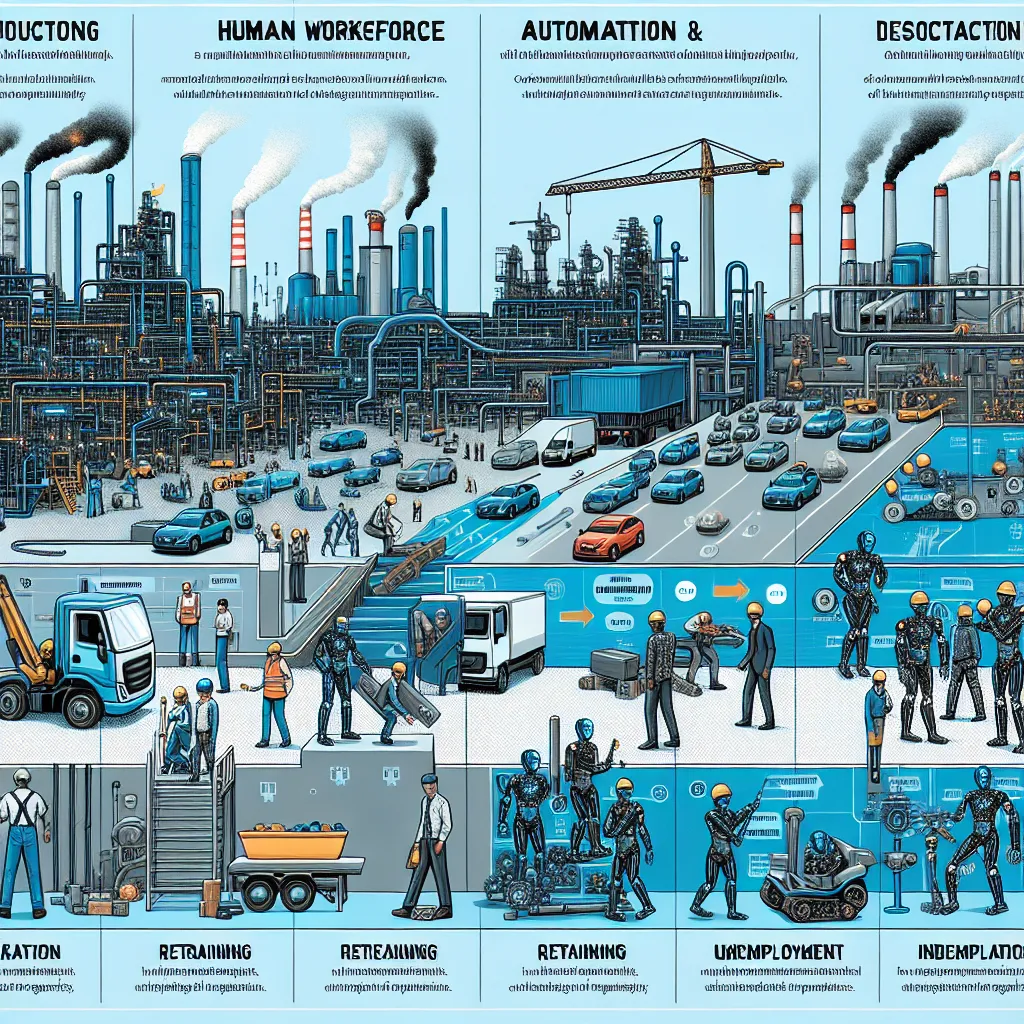As an experienced IELTS instructor, I’m excited to share with you a practice Reading test focused on the topic of renewable energy and job creation. This test will help you prepare for the IELTS exam while exploring an important contemporary issue.
Nội dung bài viết
- Introduction
- Practice Test
- Passage 1 – Easy Text
- The Rise of Green Jobs
- Questions 1-7
- Questions 8-13
- Passage 2 – Medium Text
- The Economic Impact of Renewable Energy Jobs
- Questions 14-19
- Questions 20-26
- Passage 3 – Hard Text
- The Socioeconomic Implications of the Renewable Energy Job Market
- Questions 27-32
- Questions 33-40
- Answer Key
- Passage 1
- Passage 2
- Passage 3
 Renewable energy creating new job markets
Renewable energy creating new job markets
Introduction
The IELTS Reading test consists of three passages of increasing difficulty, followed by a series of questions. Today’s practice test revolves around the theme “How renewable energy can create new job markets.” This topic is not only relevant for the IELTS exam but also crucial for understanding the future of global employment and sustainable development.
Practice Test
Passage 1 – Easy Text
The Rise of Green Jobs
The transition to renewable energy is not just an environmental imperative; it’s also a significant economic opportunity. As countries worldwide shift away from fossil fuels, new industries are emerging, creating a wealth of job opportunities in what’s commonly referred to as the “green economy.”
Renewable energy sources such as solar, wind, and hydropower are at the forefront of this transformation. These technologies require a diverse workforce, from engineers and technicians to installers and maintenance workers. For instance, the solar industry has seen remarkable growth in recent years, with jobs ranging from solar panel manufacturing to system design and installation.
Wind energy is another sector experiencing rapid expansion. Wind turbine technicians are among the fastest-growing occupations in many countries. These professionals are responsible for installing, maintaining, and repairing wind turbines, often working at great heights and in challenging conditions.
The renewable energy sector also creates indirect jobs in supporting industries. Supply chain management, transportation, and logistics play crucial roles in the renewable energy ecosystem. Moreover, as the industry grows, there’s an increasing demand for professionals in finance, legal services, and environmental consulting who specialize in renewable energy projects.
Government policies and incentives play a significant role in driving the growth of green jobs. Many countries have set ambitious targets for renewable energy adoption, which in turn stimulates job creation. For example, tax credits for solar installations can lead to increased demand for solar products and services, thereby boosting employment in the sector.
As the renewable energy industry matures, it’s not just creating jobs but also reshaping existing ones. Traditional energy sector workers are finding new opportunities by reskilling and upskilling to meet the demands of the green economy. This transition is vital for ensuring a just and inclusive shift to sustainable energy sources.
The growth of green jobs extends beyond the energy sector itself. As renewable energy becomes more prevalent, it drives innovation in other industries. For instance, the automotive industry is undergoing a significant transformation with the rise of electric vehicles, creating new jobs in battery technology, charging infrastructure, and sustainable transportation.
In conclusion, the renewable energy revolution is not just about reducing carbon emissions; it’s about creating a new economic paradigm. The green job market offers diverse opportunities for workers across skill levels and industries, promising a more sustainable and prosperous future for generations to come.
Questions 1-7
Do the following statements agree with the information given in the passage? Write
TRUE if the statement agrees with the information
FALSE if the statement contradicts the information
NOT GIVEN if there is no information on this
- The transition to renewable energy is solely driven by environmental concerns.
- Solar panel manufacturing is one of the job opportunities in the renewable energy sector.
- Wind turbine technicians often work in challenging conditions.
- The renewable energy sector has no impact on jobs in finance and legal services.
- Government policies can influence job creation in the renewable energy sector.
- Workers from traditional energy sectors cannot find jobs in the renewable energy industry.
- The growth of renewable energy is driving innovation in the automotive industry.
Questions 8-13
Complete the sentences below. Choose NO MORE THAN TWO WORDS from the passage for each answer.
- The shift towards renewable energy is creating job opportunities in what’s called the .
- is one of the fastest-growing occupations in many countries.
- The renewable energy sector creates indirect jobs in industries such as management.
- Many countries have set for adopting renewable energy, which stimulates job creation.
- Workers in traditional energy sectors can find new opportunities through and .
- The transition to renewable energy aims to be and in its approach to job creation.
Passage 2 – Medium Text
The Economic Impact of Renewable Energy Jobs
The proliferation of renewable energy technologies is not merely a technological shift; it represents a fundamental restructuring of the global economy. As nations worldwide grapple with the dual challenges of climate change and economic development, the renewable energy sector emerges as a beacon of hope, promising both environmental sustainability and economic growth.
The job creation potential of renewable energy is substantial and multifaceted. Unlike traditional fossil fuel industries, which are often geographically concentrated and capital-intensive, renewable energy projects can be implemented across diverse locations, fostering local economic development. This decentralization of energy production creates a more resilient and distributed job market, potentially revitalizing rural and deindustrialized areas.
One of the most significant aspects of renewable energy jobs is their quality. Many positions in this sector require specialized skills and offer competitive wages. For instance, solar photovoltaic installers and wind turbine technicians often require vocational training or associate degrees, providing pathways to well-paying careers without the need for advanced academic qualifications. This democratization of good job opportunities can play a crucial role in addressing income inequality and promoting social mobility.
The renewable energy sector also demonstrates a multiplier effect on job creation. For every direct job created in renewable energy projects, multiple indirect and induced jobs are generated in the broader economy. These range from manufacturing and transportation to services and research. A study by the International Renewable Energy Agency (IRENA) estimated that the renewable energy sector could employ more than 40 million people by 2050, up from 11 million in 2018.
However, the transition to renewable energy is not without challenges. The displacement of workers in fossil fuel industries is a significant concern. Policymakers and industry leaders must prioritize just transition strategies to ensure that workers in declining industries are not left behind. This involves retraining programs, support for affected communities, and policies that encourage the diversification of local economies.
The renewable energy job market is also characterized by its dynamism and innovation. As technologies evolve and new solutions emerge, novel job categories are continually being created. For example, the growing field of energy storage has spawned demand for battery technicians, while the rise of smart grids has created opportunities for data analysts and IoT specialists in the energy sector.
Moreover, the renewable energy transition is driving innovation across sectors. The concept of circular economy is gaining traction, with renewable energy playing a crucial role in sustainable manufacturing and waste management. This interconnection is creating jobs at the intersection of energy, manufacturing, and environmental services.
The global nature of the renewable energy market also presents opportunities for international collaboration and knowledge transfer. As developing countries leapfrog to renewable technologies, there’s a growing demand for expertise and training. This creates opportunities for educational institutions and training providers to develop programs that cater to the global renewable energy workforce.
In conclusion, the job creation potential of renewable energy extends far beyond the immediate sector. It represents a paradigm shift in how we conceptualize economic development and environmental stewardship. By fostering innovation, promoting inclusivity, and driving sustainable growth, renewable energy jobs are not just replacing traditional energy sector employment – they are redefining the very nature of work in the 21st century.
Questions 14-19
Choose the correct letter, A, B, C, or D.
-
According to the passage, renewable energy projects
A) are mainly concentrated in specific geographical areas
B) require more capital than traditional fossil fuel industries
C) can be implemented in various locations
D) are less resilient than traditional energy projects -
The quality of jobs in the renewable energy sector is highlighted by
A) the need for advanced academic qualifications
B) competitive wages and specialized skills requirements
C) their focus on rural development
D) their accessibility to unskilled workers -
The multiplier effect in job creation means that
A) renewable energy jobs are multiplying rapidly
B) one direct job creates multiple indirect and induced jobs
C) job growth in the sector is exponential
D) jobs are created in multiples of ten -
The main challenge in transitioning to renewable energy jobs is
A) the lack of skilled workers
B) the high cost of implementation
C) the displacement of fossil fuel industry workers
D) the slow pace of technological advancement -
The renewable energy job market is described as
A) stable and predictable
B) focused solely on energy production
C) dynamic and innovative
D) limited to a few specific roles -
The global nature of the renewable energy market
A) creates competition between countries
B) limits job opportunities to developed nations
C) focuses only on energy production
D) presents opportunities for international collaboration
Questions 20-26
Complete the summary below. Choose NO MORE THAN TWO WORDS from the passage for each answer.
The renewable energy sector is transforming the global economy by creating diverse job opportunities. Unlike traditional energy industries, renewable projects can be (20) across various locations, promoting local economic growth. Many jobs in this sector offer (21) and require specialized skills, potentially addressing (22) and promoting social mobility. The sector also has a (23) on job creation, with IRENA estimating potential employment of over 40 million by 2050. However, the transition poses challenges, particularly the (24) of workers in fossil fuel industries. The renewable energy job market is characterized by its (25) and constant innovation, creating novel job categories. This transition is also driving innovation in other sectors, promoting concepts like (26) ___ in manufacturing and waste management.
Passage 3 – Hard Text
The Socioeconomic Implications of the Renewable Energy Job Market
The advent of renewable energy technologies has catalyzed a profound transformation in the global labor market, engendering a paradigm shift that extends far beyond the confines of the energy sector. This transition, while primarily driven by environmental imperatives, has far-reaching socioeconomic implications that are reshaping the fabric of societies worldwide.
The renewable energy job market is characterized by its heterogeneity and inclusivity. Unlike traditional energy sectors, which often require a narrow set of specialized skills, the renewable energy industry encompasses a diverse array of roles that span the spectrum of educational and skill levels. This diversity has the potential to democratize access to meaningful employment, particularly in regions that have historically been marginalized in the global economy.
One of the most salient features of the renewable energy job market is its potential to address structural unemployment. Many regions grappling with the decline of traditional industries, such as coal mining or manufacturing, are finding new economic lifelines in renewable energy projects. For instance, former coal miners in Appalachia are being retrained as solar panel installers, leveraging their mechanical aptitude and work ethic in a burgeoning industry. This phenomenon of skills transferability is crucial in mitigating the social and economic disruptions often associated with industrial transitions.
Moreover, the renewable energy sector is at the forefront of promoting gender parity in the traditionally male-dominated energy industry. Organizations like IRENA have reported that women represent a higher share of the workforce in renewable energy compared to the conventional energy sector. This increased gender diversity not only addresses issues of equity but also brings diverse perspectives and innovative approaches to problem-solving in the industry.
The geographical dispersion of renewable energy jobs is another factor contributing to their socioeconomic impact. Unlike fossil fuel extraction, which is often concentrated in specific regions, renewable energy projects can be implemented across diverse landscapes. This dispersion has the potential to revitalize rural economies, create new centers of innovation, and mitigate the rural-urban divide that has been exacerbated by globalization.
However, the transition to renewable energy jobs is not without challenges. The concept of a just transition has gained prominence, emphasizing the need to ensure that the shift to a low-carbon economy does not disproportionately burden already vulnerable communities. This involves not only retraining programs but also comprehensive economic development strategies that address the multifaceted needs of communities in transition.
The renewable energy job market is also intrinsically linked to the broader knowledge economy. As the sector evolves, it is driving demand for advanced skills in areas such as data analytics, artificial intelligence, and materials science. This synergy between renewable energy and cutting-edge technologies is fostering innovation ecosystems that extend beyond the energy sector, potentially catalyzing broader economic transformations.
Furthermore, the renewable energy transition is reshaping global economic power dynamics. Countries that take the lead in renewable technologies and job creation may find themselves with increased geopolitical influence. This shift could potentially alter traditional economic dependencies and foster new patterns of international cooperation and competition.
The socioeconomic impact of renewable energy jobs is also evident in their potential to address energy poverty. In many developing countries, decentralized renewable energy projects are creating jobs while simultaneously providing access to electricity in remote areas. This dual benefit of job creation and energy access can have transformative effects on local economies and quality of life.
In conclusion, the renewable energy job market represents more than just a shift in employment patterns; it embodies a fundamental reimagining of the relationship between economy, society, and environment. By fostering inclusivity, driving innovation, and promoting sustainable development, renewable energy jobs have the potential to address some of the most pressing socioeconomic challenges of our time. As this transition unfolds, it will be crucial to ensure that its benefits are equitably distributed and that it contributes to building more resilient, sustainable, and just societies.
Questions 27-32
Choose the correct letter, A, B, C, or D.
-
The renewable energy job market is described as
A) narrow and specialized
B) heterogeneous and inclusive
C) focused on highly skilled labor
D) limited to specific regions -
The concept of skills transferability in the renewable energy sector refers to
A) the need for completely new skills
B) the difficulty in adapting to new roles
C) the ability to use existing skills in new contexts
D) the requirement for advanced degrees -
According to the passage, the renewable energy sector
A) has a lower proportion of women than traditional energy
B) is exclusively male-dominated
C) has a higher share of women compared to conventional energy
D) does not impact gender parity in employment -
The geographical dispersion of renewable energy jobs
A) concentrates economic benefits in urban areas
B) has no impact on rural economies
C) potentially revitalizes rural economies
D) is limited to specific regions like fossil fuel extraction -
The concept of a ‘just transition’ in renewable energy emphasizes
A) rapid job creation at any cost
B) focusing solely on environmental benefits
C) ensuring the transition doesn’t disproportionately burden vulnerable communities
D) prioritizing urban development over rural areas -
The renewable energy transition’s impact on global economic power dynamics suggests
A) maintaining the status quo in international relations
B) potential shifts in geopolitical influence
C) decreased international cooperation
D) no effect on traditional economic dependencies
Questions 33-40
Complete the summary below. Choose NO MORE THAN TWO WORDS from the passage for each answer.
The renewable energy job market is transforming the global labor landscape with significant socioeconomic implications. It offers diverse roles across various (33) and skill levels, potentially democratizing access to employment. This sector shows promise in addressing (34) unemployment, particularly in regions facing industrial decline. The industry promotes (35) ___ in the traditionally male-dominated energy sector, bringing diverse perspectives to problem-solving.
The (36) of renewable energy jobs contributes to their socioeconomic impact, potentially revitalizing rural economies. However, the transition faces challenges, with the concept of a (37) gaining prominence to protect vulnerable communities. The renewable energy sector is closely linked to the (38) ___, driving demand for advanced skills in various technological fields.
This transition is also reshaping (39) power dynamics, potentially altering international cooperation patterns. Additionally, renewable energy jobs play a role in addressing (40) in developing countries, providing both employment and electricity access in remote areas.
Answer Key
Passage 1
- FALSE
- TRUE
- TRUE
- FALSE
- TRUE
- FALSE
- TRUE
- green economy
- Wind turbine
- supply chain
- ambitious targets
- reskilling, upskilling
- just, inclusive
Passage 2
- C
- B
- B
- C
- C
- D
- implemented
- competitive wages
- income inequality
- multiplier effect
- displacement
- dynamism
- circular economy
Passage 3
- B
- C
- C
- C
- C
- B
- educational
- structural
- gender parity
- geographical dispersion
- just transition
- knowledge economy
- global economic
- energy poverty
In this practice test, we’ve explored how renewable energy is creating new job markets and transforming the global economy. Remember to practice regularly and familiarize yourself with various question types to improve your IELTS Reading skills. Good luck with your IELTS preparation!
For more information on related topics, you might find these articles helpful:
- [The Future of Renewable Energy in


